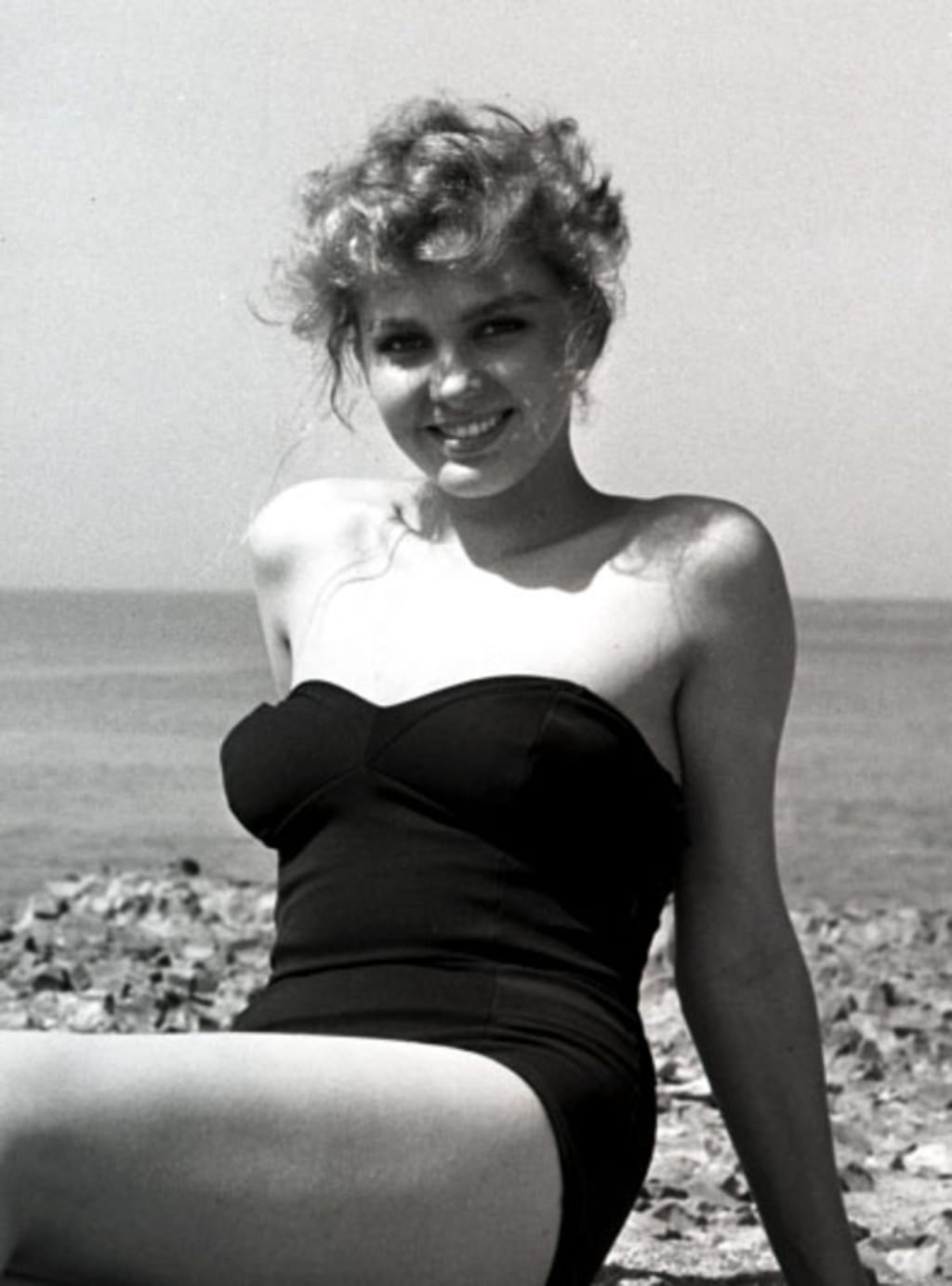Examining Isabelle Corey in 'Bob Le Flambeur'
In her first film role, Isabelle Corey created a French New Wave Icon.

In 1956, model Isabelle Corey got her big break in the movies when legendary director Jean Pierre Melville discovered her in the Latin Quarter of Paris. Melville cast Corey as Anne in his classic noir Bob Le Flambeur. Corey would go on from there to star in Roger Vadim’s And God Created Woman, alongside the legendary Brigitte Bardot before moving to Italy to work with some of that country’s legends including Franco Rossi, Vittorio De Sica and Roberto Rossellini. Corey made 16 films in 15 years before quitting the business in 1961.
Regardless of her work with Vadim and Rossellini or her relative obscurity since the early 60s, she passed away quietly in 2011, Corey will always be remembered as Anne in Bob Le Flambeur and this article aims to show you why. Why is Anne so important to Bob Le Flambeur? What is it about Corey’s performance that stands out so much? And finally, how does Melville use Anne in the story of Bob Le Flambeur, and what does it say about the director and his film?
We first meet Anne early one morning on the streets in a small corner of Paris. When she enters the scene, the camera seizes upon her and while the narration says little about her, we somehow know she will be important. We next see Anne buying French Fries and casually discarding them on the street before taking off with some seeming stranger on a motorbike. Her manner is indifference, or as some might stereotype it, typically French.
Our protagonist, Bob (Roger Duchesne), first spies Anne boarding the motorbike and something about her is striking to him though his face betrays little of what he’s thinking. Later, Anne and Bob meet again when Bob sees Anne at his favorite watering hole talking to a small-time pimp named Marc. Knowing what Marc is planning for Anne, Bob intervenes, shoos Marc away and takes Anne home with him. Bob is an elderly man, slicked back gray hair and wizened eyes. He lost some of his life to a stay in prison following a bank job gone wrong.
He’s a former gangster and, having been a gangster, he has a code of honor, one that doesn’t include being kind to pimps. Bob did not take Anne home because he thought she was easy or because he thought she might be grateful. Rather, he thinks like a gambler in this moment, he bets that this beautiful young lady, attracted to tough boys like Marc might be a good fit for his young apprentice Paolo, a budding gambler and con in his own right and the son of a man killed in Bob’s foiled heist.
Anne sleeps in Bob’s home, but on his pull-out couch, not in his bed. He gives her money to find a hotel but seems to know she’ll be back that night looking for something more. In fact, I am inferring that they both know she will back and Bob confirms the feeling by orchestrating the introduction to Paolo. Here, Anne serves multiple functions in the film. Of course, she’s a symbol of desire, the kind of woman a man like Bob would have killed for in his younger days. She also serves as part of the emotional core of a film that doesn’t appear at first glance all that emotional.
The French cinema, in fact, seems to take great pride in rarely showing any emotion but rather allowing the story to play out among impassive tough guys acting out Greek tragedies with stone faces. Naturally, it takes a woman to bring out the emotion of French film, and Anne taps our emotions first with our pity for her, she’s quite poor yet beautiful and living in the wrong part of town, and our desire for her and her effortless sensuality.
Later, as the plot develops, Anne becomes the film’s most important device as Paolo’s overwhelming desire for her is the catalyst that leads to the film’s tragicomic ending. Throughout most of her affair with Paolo Anne is cruelly disinterested emotionally while more than willingly physical. Anne and Paolo fall easily in bed together but when the naïve Paolo desires an actual relationship with Anne, she brushes him off not with care but with a sarcastic giggle.
Paolo’s perseverance is his downfall. Once he assumes that Anne is only looking for a man who can take care of her financially he lets slip Bob’s plan for the Deauville Casino and the wheels of the plot begin to truly turn. Soon, Anne is in Marc’s bed poking cruel fun at Paolo’s devotion to her and what she believes is a lie about he and Bob robbing Deauville. Marc, however, doesn’t think Paolo is lying and with his desire for revenge against Bob we see his eyes flicker in the close-up of Melville’s camera, and we get more hints of the raging emotions that French filmmakers do their best to hold back in favor of characters appearing always cool.
Once Anne realizes what Marc has planned for Paolo, and more importantly to her, for Bob, she finally lets slip some emotion of her own. She runs to tell Bob what she’s done and is met with violence followed by Bob once again inviting her to stay in his home. Meanwhile, Anne’s betrayal has harmed Paolo so deeply and jeopardized Bob so much that Paolo murders Marc in cold blood in front of a crowded restaurant.
As Jean-Luc Godard said, “All you need for a movie is a girl and a gun.” Of course, Godard said that much-repeated line several years after Melville directed Bob Le Flambeur. Godard’s implication was that the girl was just as dangerous as the gun and in the case of Paolo, Marc, and Anne, that’s most definitely true. That’s not to say that Anne is at fault for either man’s death, only that desire for a woman can drive a man to incredible lengths, especially when that woman is as unattainable as Anne is to Paolo.
So, what does all of this tell us about Anne? What was Jean Pierre Melville saying in his use of Anne within the plot of Bob Le Flambeur and what about her relationship to Bob himself? Anne is quite a conundrum. We believe she’s sympathetic but then find her scheming, we believe she can be redeemed with a job and a relationship with sweet Paolo and then find her in bed with Marc. We see cracks in her emotionless façade but only when she thinks she might have hurt Bob, her supposed sugar daddy.
Back and forth we go with Anne, all the while Isabelle Corey’s calm unflinching demeanor keeps us emotionally unmoored. Anne’s actions make us angry but Corey’s face gives us nothing, and, like Paolo, we are drawn to her despite her impassivity and especially to her innate sensuality. Anne has grown up playing the game of getting men to give her things and do things for her and despite her youth, she’s had time to build up a desire to win men over when they don’t give her what she wants. That’s why Paolo is a mere distraction to her, she wants Bob. She wants Bob because Bob doesn’t want her.
Does such a portrayal play into male misogynist stereotypes of women in the 1950’s and beyond? Yes, generally speaking, Anne is emblematic of male fears about female sexuality. Anne is portrayed as a gold-digger, she’s portrayed as sexually avaricious, and the men she seduces into bed in the film, each end up dead, both as symbols of what giving into female sexual desire can do to a man. That would be the less educated takeaway.
A more nuanced look at Anne requires us to look at Isabelle Corey and when you do you find a performance of tremendous bravery and charisma. Anne is at once a force of nature and a demure woman of little means. She evokes desire and sympathy all the while never betraying that she intends any such effect. Corey’s beautiful eyes may intend to seduce but something about her manner indicates that she may not really have any plan at all.
Is she interested in the kindness and seeming wealth of a man like Bob? Yes, she is, but is there far more to it than just gold-digging? I believe so. Late in the film, when Anne is concerned that she’s blown Bob’s plan her concern for him is the first genuine emotion she shows in the movie. Does that mean that she has fallen in love with the much older man? No, but it shows that she has come to care about something other than herself for maybe the first time in her young life and that growth is one of the few natural character arcs in a film that isn’t particularly interested in cinematic arcs.
When Godard uttered his famous statement, I mentioned earlier about a girl and a gun, he could have been referring directly to Isabelle Corey as Anne in Bob Le Flambeur. Anne is a near perfect depiction of how the French New Wave would come to portray women, only slightly more emotional than Jean Seberg, the true subject of Godard’s famous line. Cool and apathetic may be a French stereotype but it’s one that gives Anne strength as a character. We ache to see her face betray her true feelings for once and when it does, the film crescendos momentarily before beginning its next movement. That’s the power of Isabelle Corey’s performance and Melville’s supreme direction of just how to employ that performance.
About the Creator
Sean Patrick
Hello, my name is Sean Patrick He/Him, and I am a film critic and podcast host for the I Hate Critics Movie Review Podcast I am a voting member of the Critics Choice Association, the group behind the annual Critics Choice Awards.






Comments (1)
Great review! Just watched it